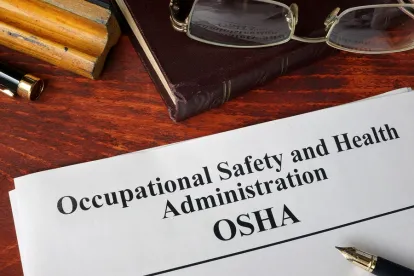As we reported here, on January 13, 2022, the U.S. Supreme Court put on hold the implementation and enforcement of the Occupational Safety and Health Administration’s (OSHA) COVID-19 Vaccination and Testing Emergency Temporary Standard (ETS) pending further review by the U.S. Court of Appeals for the Sixth Circuit on the merits of the case. In a separate case, the Supreme Court upheld the Health and Human Services rule that requires the COVID-19 vaccination for all employees of health care providers that participate in Medicare and Medicaid.
This latest development in the ongoing saga of vaccine mandates is sure to cause confusion among employers that are considering how best to respond to the challenges presented by the COVID-19 pandemic. Below are answers to the questions we are hearing from our clients in the aftermath of the Supreme Court decisions.
1. What does the Court’s decision mean for employers that have already implemented vaccine mandates?
The Supreme Court’s decision in National Federation of Independent Business v. OSHA and Ohio v. OSHA does not prohibit employers from requiring that some or all of their employees be vaccinated, subject to exceptions based on medical and religious accommodation under applicable federal and state law. However, in the absence of the ETS, which pre-empted contrary state laws, employers must check applicable state laws. Several states have already adopted restrictions or prohibitions against employer vaccine mandates (e.g., FL, TX) and it would not be surprising if other states consider similar restrictions.
Employers that have already implemented a vaccine mandate but now wish to rescind it in light of the Court’s decision can now do so, but see Question 6 below. The ETS is not completely dead yet. Again, check applicable state law – employers may be subject to COVID-19 vaccine/testing requirements under state or local law (e.g., NYC).
2. If an employer has not implemented a vaccine mandate yet but wants to do so, can the employer use the same vaccine or test + mask approach that was available under the ETS?
Yes. Employers may voluntarily adopt the ETS frameworkor another policy that might work better for the employer’s needs. Again, check state law for any requirements or restrictions on implementing the vaccine or test + mask approach. It is also prudent for employers to include language suggesting that they are monitoring legal developments and they reserve the right to revise the policy as needed to comply with applicable law.
3. Do we need to destroy the proof of vaccination that we already gathered from our employees?
No, just the opposite. The Supreme Court’s decision does not affect employers’ ability to retain or destroy the proof of vaccination. We recommend you retain the records. This decision was a preliminary ruling by the Court. In the unlikely event the Court reverses course, employers will want the records. Employers who intend to continue with a vaccine mandate (or offer the alternative of vaccine or test + mask) should retain that information. Also, employers that rescind their current vaccine mandate should consider retaining the proof of vaccination while the ETS case is still ongoing.
4. Does this mean we no longer have to pay employees for their time spent getting vaccinated and/or recovering from vaccine side effects?
Yes. Since the ETS is no longer in effect, there is no federal requirement to pay employees for time spent getting vaccinated or recovering from the vaccine’s side effects. However, check state law, as there are some states (e.g., MA) that have similar mandates in effect.
5. Why was the health care mandate permitted to go forward but the large employer mandate was not?
In imposing a stay of the ETS, the Supreme Court ruled that OSHA likely exceeded its statutory authority when issuing the ETS. In contrast, the Supreme Court in Biden v. Missouri and Becerra v. Louisiana decided that the Secretary of Health and Human Services (HHS) is likely within its statutory authority to require vaccination for health care workers at facilities that receive Medicare and Medicaid funding - at least until the U.S. Court of Appeals for the Fifth and Eighth Circuits fully hear and render decisions on the merits of the pending challenges to the health care rule. In other words, the source of the legal authority differs between the ETS and the health care rule and, therefore, the Supreme Court was able to reach different decisions in these cases.
6. Is there any chance that the ETS will come back, or is the Supreme Court’s decision the final word on the ETS?
The Supreme Court’s decision does not put an end to the ETS. The 6th Circuit must still rule on the merits of the many challenges to the ETS that were consolidated in that court. Depending on what the 6th Circuit does, there may be another appeal to the Supreme Court.
That said, it remains to be seen what OSHA will do in light of the Supreme Court’s decision. The Secretary of Labor published an important statement in response to the Court’s decision, providing in part:
“We urge all employers to require workers to get vaccinated or tested weekly to most effectively fight this deadly virus in the workplace. Employers are responsible for the safety of their workers on the job, and OSHA has comprehensive COVID-19 guidance to help them uphold their obligation.”
“Regardless of the ultimate outcome of these
proceedings, OSHA will do everything in its existing authority to hold businesses accountable for protecting workers, including under the COVID-19 National Emphasis Program and General Duty Clause.”
7. What about the federal contractor mandate? Was that affected by the Court’s decisions?
The Supreme Court’s decisions do not address the federal contractor vaccine mandate that is presently enjoined on a nationwide basis by a federal district court in Georgia.
8. When will this pandemic be over?
Sorry, that one is beyond our expertise.



 />i
/>i

